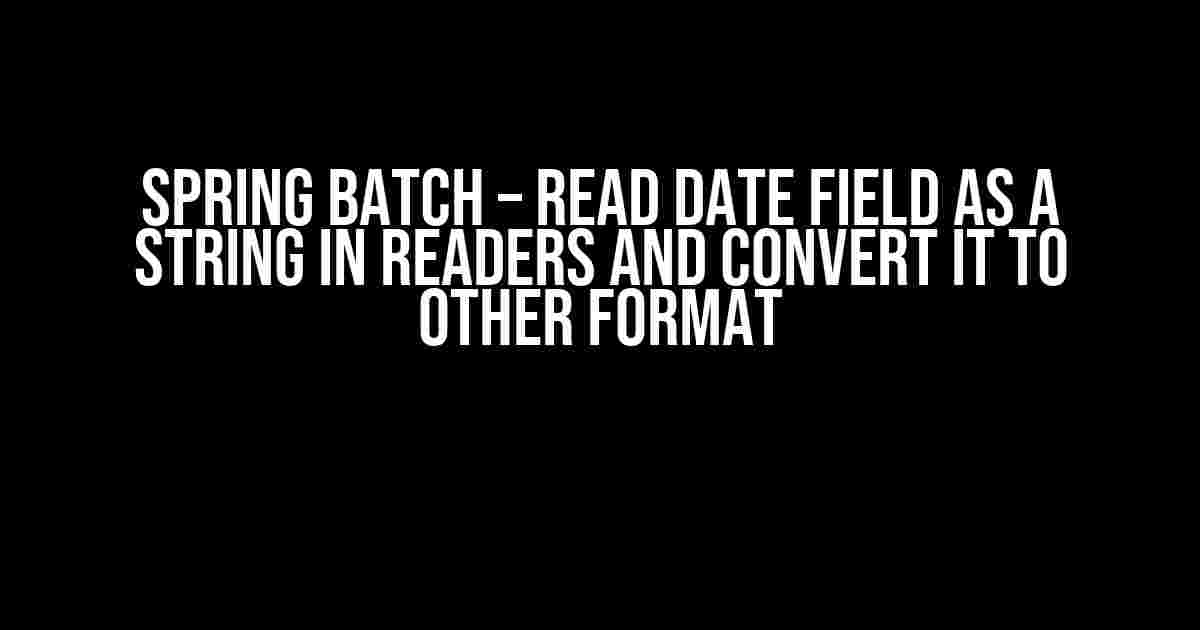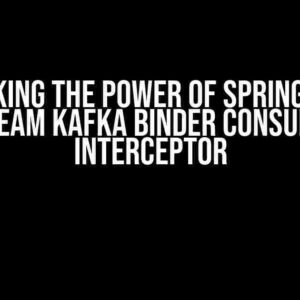Are you tired of dealing with date fields in your Spring Batch application? Do you find yourself struggling to read date fields as strings and convert them to other formats? Well, worry no more! In this article, we’ll show you how to read date fields as strings in readers and convert them to other formats with ease.
Understanding the Problem
When working with date fields in Spring Batch, you might encounter issues when reading date fields as strings. By default, Spring Batch reads date fields as java.util.Date objects, which can lead to formatting issues. For instance, if your input file contains a date field in the format “yyyy-mm-dd”, Spring Batch might interpret it as “mm-dd-yyyy” instead. This can cause problems when processing data.
To overcome this issue, you need to read date fields as strings and then convert them to the desired format. But how do you do that?
The Solution
The solution lies in using a custom FieldSetMapper and a CustomDateEditor. But before we dive into the code, let’s understand the concept.
A FieldSetMapper is an interface in Spring Batch that allows you to map input fields to objects. By implementing this interface, you can tailor the mapping process to your needs. In our case, we’ll use it to read date fields as strings.
A CustomDateEditor, on the other hand, is a property editor that allows you to customize the way date fields are converted. We’ll use it to convert the string date field to the desired format.
Step 1: Create a Custom FieldSetMapper
public class CustomFieldSetMapper implements FieldSetMapper<MyObject> {
@Override
public MyObject mapFieldSet(FieldSet fieldSet) throws BindException {
MyObject myObject = new MyObject();
// Read date field as a string
String dateString = fieldSet.readString("dateField");
// Convert the string date field to the desired format
SimpleDateFormat sdf = new SimpleDateFormat("yyyy-mm-dd");
Date date = sdf.parse(dateString);
// Set the date field in the object
myObject.setDateField(date);
// Set other fields
myObject.setField1(fieldSet.readString("field1"));
myObject.setField2(fieldSet.readString("field2"));
return myObject;
}
}
In the above code, we’re reading the date field as a string using the readString() method of the FieldSet interface. We then use a SimpleDateFormat object to parse the string date field to a Date object.
Step 2: Create a CustomDateEditor
public class CustomDateEditor extends PropertyEditorSupport {
@Override
public void setAsText(String text) throws IllegalArgumentException {
SimpleDateFormat sdf = new SimpleDateFormat("yyyy-mm-dd");
try {
Date date = sdf.parse(text);
setValue(date);
} catch (ParseException e) {
throw new IllegalArgumentException("Invalid date format");
}
}
}
In the above code, we’re extending the PropertyEditorSupport class and overriding the setAsText() method. This method is called when the editor is set with a string value. We use a SimpleDateFormat object to parse the string date field to a Date object.
Step 3: Register the CustomDateEditor
@Bean
public CustomFieldSetMapper customFieldSetMapper() {
CustomFieldSetMapper fieldSetMapper = new CustomFieldSetMapper();
return fieldSetMapper;
}
@Bean
public CustomDateEditor customDateEditor() {
CustomDateEditor dateEditor = new CustomDateEditor();
return dateEditor;
}
@Bean
public JobBuilderFactory jobs() {
return new JobBuilderFactory();
}
@Bean
public StepBuilderFactory steps() {
return new StepBuilderFactory();
}
@Bean
public JobExecutionListener listener() {
return new JobExecutionListener();
}
@Bean
public JobLauncher jobLauncher() {
return new SimpleJobLauncher();
}
@Bean
public JobRepository jobRepository() {
return new SimpleJobRepository();
}
@Bean
public PlatformTransactionManager transactionManager() {
return new ResourcelessTransactionManager();
}
@Bean
public JobRegistry jobRegistry() {
return new MapJobRegistry();
}
@Bean
public JobOperator jobOperator() {
return new SimpleJobOperator();
}
@Configuration
@EnableBatchProcessing
public class AppConfig {
@Autowired
private JobBuilderFactory jobs;
@Autowired
private StepBuilderFactory steps;
@Bean
public Job job() {
return jobs.get("myJob")
.start(step1())
.build();
}
@Bean
public Step step1() {
return steps.get("step1")
.<MyObject, MyObject>chunk(10)
.reader(itemReader())
.processor(itemProcessor())
.writer(itemWriter())
.build();
}
@Bean
public ItemReader<MyObject> itemReader() {
FlatFileItemReader<MyObject> reader = new FlatFileItemReader<>();
reader.setResource(new ClassPathResource("input.txt"));
reader.set LineMapper(new DelimitedLineMapper<MyObject>());
reader.setLineTokenizer(new DelimitedLineTokenizer());
// Register the custom field set mapper
reader.setFieldSetMapper(customFieldSetMapper());
return reader;
}
@Bean
public ItemProcessor<MyObject, MyObject> itemProcessor() {
return new ItemProcessor<MyObject, MyObject>() {
@Override
public MyObject process(MyObject item) throws Exception {
return item;
}
};
}
@Bean
public ItemWriter<MyObject> itemWriter() {
return new ConsoleItemWriter<>();
}
}
In the above code, we’re registering the custom FieldSetMapper and CustomDateEditor as beans. We then use the FieldSetMapper in the ItemReader to read the date field as a string and convert it to a Date object using the CustomDateEditor.
Conclusion
In this article, we’ve shown you how to read date fields as strings in readers and convert them to other formats using a custom FieldSetMapper and CustomDateEditor. By following these steps, you can easily handle date fields in your Spring Batch application and avoid common formatting issues.
Common Pitfalls
When working with date fields in Spring Batch, it’s easy to fall into common pitfalls. Here are a few things to keep in mind:
- Make sure to register the custom
FieldSetMapperandCustomDateEditoras beans in your application context. - Verify that the date format in your input file matches the format specified in the
SimpleDateFormatobject. - Handle exceptions properly when parsing date fields to avoid errors.
Best Practices
Here are some best practices to keep in mind when working with date fields in Spring Batch:
- Use a consistent date format throughout your application.
- Verify the input data to ensure that it matches the expected date format.
- Use a custom
FieldSetMapperandCustomDateEditorto handle date fields. - Test your application thoroughly to ensure that date fields are being processed correctly.
| Format | Description |
|---|---|
| yyyy-mm-dd | Year-month-day format |
| mm-dd-yyyy | Month-day-year format |
| dd-mm-yyyy | Day-month-year format |
In conclusion, reading date fields as strings in readers and converting them to other formats is a common task in Spring Batch. By following the steps outlined in this article and adhering to best practices, you can easily handle date fields in your application and avoid common formatting issues.
Frequently Asked Question
Get answers to your most burning questions about Spring Batch – reading date field as a String in readers and converting it to other formats!
How do I read a date field as a String in Spring Batch readers?
To read a date field as a String in Spring Batch readers, you can use the `String` type in your item reader’s field set. For example, if you’re using a `DelimitedLineTokenizer` to read a CSV file, you can specify the date field as a `String` like this: `tokenizer.addColumnmapping(“dateField”, “String”);`. This will read the date field as a String, instead of trying to parse it as a date.
How do I convert the String date field to a Date object in Spring Batch?
To convert the String date field to a Date object, you can use a `Formatter` or `DateTimeFormatter` in your item processor. For example, you can use the `DateTimeFormatter` from the `java.time` package like this: `LocalDate date = LocalDate.parse(stringDate, DateTimeFormatter.ofPattern(“yyyy-MM-dd”));`. Alternatively, you can use a ` DateFormatter` from the Spring Framework like this: `Date date = DateFormatter.parse(stringDate, “yyyy-MM-dd”);`.
Can I use a custom date format in Spring Batch readers?
Yes, you can use a custom date format in Spring Batch readers! When using a `DelimitedLineTokenizer`, you can specify a custom date format using the `dateFormat` property. For example: `tokenizer.setDateFormat(“MM/dd/yyyy”);`. This will tell the tokenizer to expect dates in the “MM/dd/yyyy” format. Similarly, when using a `ItemProcessor` to convert the String date field to a Date object, you can use a custom date format with the `DateTimeFormatter` or `DateFormatter`.
How do I handle date fields with different formats in Spring Batch readers?
To handle date fields with different formats in Spring Batch readers, you can use a combination of multiple `DateTimeFormatter`s or `DateFormatter`s in your item processor. For example, you can create a list of possible date formats and iterate through them until one successfully parses the date string. Alternatively, you can use a library like Joda-Time or Apache Commons Lang, which provide more advanced date parsing capabilities.
What if my date field is nullable in Spring Batch readers?
If your date field is nullable in Spring Batch readers, you should handle the null case in your item processor. You can use a simple null check to avoid `NullPointerException`s when trying to parse the date string. For example: `if (stringDate != null) { … parse date … }`. Alternatively, you can use a library like Apache Commons Lang, which provides a `StringUtils` class with methods for handling null strings.


